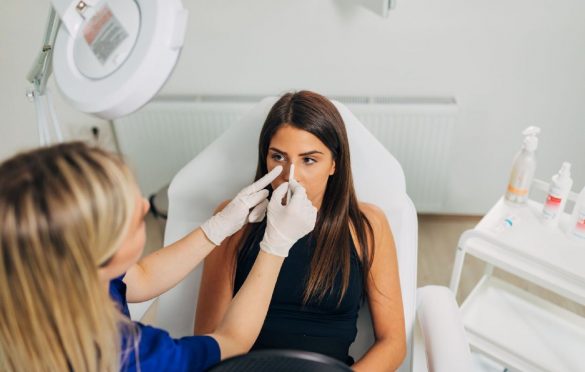Does Rhinoplasty Improve Sleep Apnea?

Rhinoplasty also referred to as a nose job, is one of the most popular cosmetic procedures in the world. While it is commonly done for cosmetic reasons, it can also help improve breathing. This is especially true for those with sleep apnea, a condition that causes an interruption in breathing during sleep.
In this post, we’ll discuss how rhinoplasty can help improve sleep apnea and provide tips for choosing a surgeon.
Table of Contents
Sleep Apnea: What Is It
Sleep apnea is a fairly common disorder affecting an estimated 22 million Americans. Briefly, sleep apnea is when a person’s breathing stops and repeatedly starts during sleep. It can lead to several problems, including fatigue, snoring, and even heart disease.
Interestingly, top rhinoplasty may improve sleep apnea. Some people with sleep apnea have found relief after undergoing rhinoplasty surgery. It’s thought that the improvement in airflow caused by surgery helps improve sleep apnea symptoms. While more research is needed, this is an exciting development for those who suffer from this disorder.
Relationship between Rhinoplasty and Sleep Apnea
Rhinoplasty is a surgery performed on the nose to improve its appearance. It can correct a deviated septum, narrow the nose, or change the shape of the nose. And during rhinoplasty, some surgeons employ implants in the face usually to enhance the facial contours.
Well, in some cases, rhinoplasty can also be used to improve sleep apnea. The surgery can help improve airflow through the nose and reduce sleep apnea symptoms.
How Rhinoplasty Can Help with Sleep Apnea
So, how can rhinoplasty help with sleep apnea? There is no definitive answer to whether or not rhinoplasty improves sleep apnea. Some people claim that their sleep apnea went away after surgery, while others say it only worsened their sleep apnea.
Therefore, there are various treatments for sleep apnea, including CPAP machines and mouthpieces, but some people may also benefit from surgery to correct the underlying cause of their sleep apnea. Rhinoplasty can help improve sleep apnea by fixing anatomical issues causing the obstruction.
For example, if someone has a deviated septum, a common cause of sleep apnea, rhinoplasty can help straighten the septum and improve airflow. So, rhinoplasty can help to open up the nasal passages, making it easier for air to flow through.
And this improved airflow can be beneficial in several ways:
- Its can help reduce snoring, the most common symptom of sleep apnea.
- It can improve the quality of your sleep, as you’ll be less likely to wake up gasping for air.
- It may also help to reduce the severity of sleep apnea episodes.
If you’re suffering from sleep apnea and are considering rhinoplasty, talk to your surgeon about your options. They will be able to tell you whether this procedure could help to improve your symptoms.
FAQs
Are There Any Risks Associated with Rhinoplasty?
As with any surgery, there are risks associated with rhinoplasty. These can include infection, bleeding, and a change in the appearance of your nose. It’s important to discuss these risks with your doctor before you decide to go ahead with the surgery.
Another potential complication of rhinoplasty is breathing through your nose is complex. Your nose and the surrounding area may become permanently numb, and there’s a possibility for a nose that looks uneven.
Is Rhinoplasty a Risky Procedure?
Rhinoplasty is regard as a procedure with considerable risks, mainly because of the unpredictable nature of the aesthetic outcome. What causes this? An excellent result right after surgery could look quite different a year later. In fact, there are rare reports on the long-term effects of rhinoplasty.
How Frequent Are Rhinoplasty-Related Complications?
Significant systemic or life-threatening complications occur in between 1.7 and 5% of rhinoplasty cases. Intracranial problems are pretty uncommon. However, a study of 4978 rhinoplasty patients found that the prevalence of significant complications was only 0.7%.
How Do I Know if I Need Rhinoplasty?
Surgery is likely the best solution if you’re experiencing difficulty breathing. However, there are other factors to consider as well.
Do you snore? you feel tired all the time? Do you have difficulty sleeping? If you indicated that you did in any of these inquiries, you may suffer from sleep apnea and should speak to a doctor about your options.
How Do I Find a Qualified Surgeon?
It’s essential to do your research and ask around to find a surgeon who has experience performing this type of surgery. It would help if you also were sure to visit their office and see examples of their work.
If you’re unsure where to start, the American Society of Plastic Surgeons (ASPS) is an excellent place to start. The ASPS is the largest professional organization for plastic surgeons worldwide, and they have a searchable database of qualified surgeons.
Can A Blocked Nose Cause Sleep Apnea?
Airflow resistance and speed are pathologically altered as a result of nasal blockage. So nasal raises resistance and causes sleep-disordered breathing events such as apnea, hypopnea, and snoring.
Can Rhinoplasty Make Breathing Easier?
In functional rhinoplasty, the nose is reshape to improve nasal airflow and drainage. It improves your ability to breathe.


